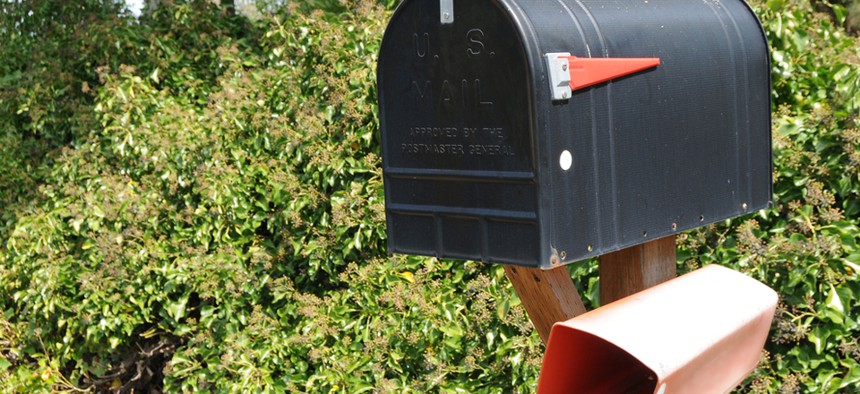
Vlue/Shutterstock.com
You May Soon Have a Longer Walk to Get Your Mail
With comprehensive postal reform stuck in neutral, House panel passes piecemeal legislation.
A House committee on Wednesday passed a piecemeal provision of U.S. Postal Service reform, voting along party lines to phase out to-the-door delivery in favor of centralized and curbside drop offs.
House Oversight and Government Reform Committee Chairman Darrell Issa, R-Calif., introduced the Secure Delivery for America Act earlier this week in an effort to find immediate cost savings for the Postal Service while Congress continues to debate a larger overhaul. Issa estimated the measure would save USPS more than $2 billion annually.
The bill would convert 1.5 million of the 37.7 million addresses currently receiving to-the-door delivery to centralized or curbside delivery annually for the next 10 years. This would ultimately result in a 40 percent reduction in households that receive their mail at their doors. Currently, slightly more than one quarter of addresses receive door delivery.
The Postal Service would assume the full conversion costs, which Issa estimated would add up to about $73 per address. The savings would allow USPS to recoup its full installation costs after just five months, Issa said. He added the new system -- in which every address would have its own secure box grouped together in a central location -- would provide safer delivery than simply leaving packages on a stoop.
When the Postal Service identified an address for conversion, it would have to provide 60 days’ notice to the customer. Residents could then file a hardship waiver for exemption if they possess a disability that would make it difficult for them to travel to a separate location for picking up their mail.
Issa said his bill represented a “common-sense way to help the Postal Service save money,” but stressed the measure was not a replacement for comprehensive legislation. He did intimate, however, the provision would provide an opportunity for both parties and chambers of Congress to address postal concerns through a conference committee.
Democrats opposed the measure, repeating the claim they have made throughout the series of postal hearings and markups this Congress that USPS “cannot cut its way to profitability.”
Rep. Gerry Connolly, D-Va., said the bill would place an unfair burden on residents of urban areas, where the vast majority of to-the-door delivery still takes place. Rep. Stephen Lynch, D-Mass., criticized a provision of the bill that would allow residents chosen for conversion to pay a fee to continue to receive to-the-door service, calling it a “delivery tax.” Lynch also pointed to a Government Accountability Office report that found some of the data Issa used for his underlying cost savings estimates may be outdated.
Postal unions said the measure would be detrimental to business. Louis Atkins, president of the National Association of Postal Supervisors, said the up-front costs associated with making the transition would “drag down the Postal Service’s finances further.”
Issa acknowledged some households may never be ripe for conversion, but defended the fee for delivery as a revenue opportunity for the cash-strapped Postal Service. The Democrats attempted to attach union-backed amendments to the bill, such as guaranteed six-day mail delivery and a return of the surplus payments made to the Federal Employees Retirement System, but they were defeated.
(Image via Vlue/Shutterstock.com)
NEXT STORY: How Big Data Can Improve Your Health







